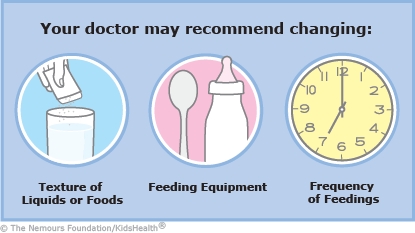Oral Dysphagia: How to Care for Your Child
Oral ("mouth") dysphagia is when a problem with the mouth causes trouble swallowing. Oral dysphagia (diss-FAY-jee-uh) often can be managed with changes in how and what you feed your child.


-
Help your child with mouth exercises as instructed by the care team.
-
Make any changes to your child's diet and feeding as instructed by the care team. This may include thickening liquids; changing the amount, texture, taste, or temperature of the food; changing what you use to feed your child; or slowing down the pace as your child eats.
-
Make meals a low-stress time.
-
Tell your child's school staff or childcare providers about any changes to your child's diet and any special requirements during meals.
-
Schedule any follow-up visits as directed.

Your child:
-
coughs or gags during eating or drinking
-
makes wet or gurgling sounds when eating
-
gets a stuffy nose, cold, or cough
-
has a fever
-
resists eating

Your child:
-
has lips or skin that look blue or gray
-
has a choking spell
-
becomes very short of breath
-
has skin between the ribs and neck that pulls in tight during breathing
-
shows signs of dehydration (not enough water in the body), such as a dry, sticky mouth; increased thirst; peeing less often than usual; dark pee; or crying with little or no tears

Why do some kids get oral dysphagia? Oral dysphagia is more common in premature infants because their muscles often are less developed than those of babies who were born full-term. But it can happen in other kids too. Kids can have oral dysphagia for lots of reasons, including problems with the mouth or jaw muscles, trouble with saliva (spit), and a cleft lip or cleft palate.
What are the signs of oral dysphagia? Kids with oral dysphagia may have trouble biting, chewing, taking food from a spoon, or taking in liquids. They may gag a lot or have trouble learning to eat solid foods. They may take a long time to eat or may be irritable during meals.
How is oral dysphagia treated? Treatment is based on the specific problems oral dysphagia causes. It might include a change in the texture or thickness of foods; smaller, more frequent meals; or a change in feeding equipment (such as nipples, spoons, or cups), if used. It also may include feeding therapy with a speech therapist or occupational therapist. The therapist may show you mouth exercises for your child to do at home to help with eating. The exercises can improve strength and coordination of the muscles used in eating.